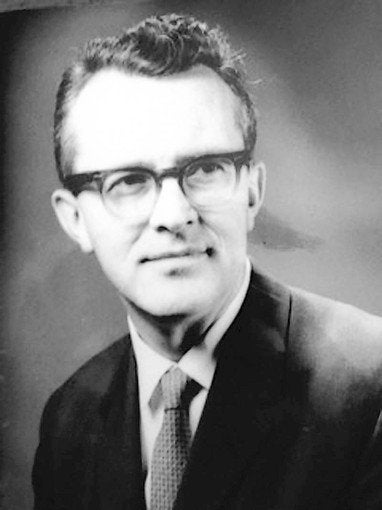For years I’ve had a detached, even cold response to the deaths of strangers and loved ones alike. I can’t properly feel these odd new absences. Last year, when told my last living grandparent had slipped away, I just sighed deeply, long prepared for this moment and still barely able to comprehend it. When you expect things too much, they barely happen.
After a slow physical and mental decline that, as a medical professional, he was well-qualified to self-diagnose in advance, Dr. Gerald D’Arcy Klee passed at the age of 86. Typically, I grieved to lose him but understood that the warm, witty man I adored and admired had been eclipsed by mere illness, and that my family might find some comfort in the conclusion of his suffering. I was sure, given the logical cast of his mind, that he’d find most mourning excessive.
Grandpa had always been one for a sprawling anecdote, though toward the end he returned elliptically, endlessly, to a quaint and simple one. As a G.I. during World War II, he took a pretty young date to Coney Island, where she fixated on the Parachute Jump (now a defunct, rusting monument). Queasy at the thrill ride’s 250-foot drop, he struggled to maintain his composure—and lunch—while she screamed with delight. Just as they touched down safely, he’d tell us with a smile, she announced that she wanted to go up again.
 Repeating that story to myself later on, I had to admit that I knew less about my grandfather than I would’ve liked. He’d told me much about his youth: growing up in the Great Depression, biking through the Berkshire Mountains, getting shot in the pinky during basic training, his illuminating tour of postwar Europe. But his towering career in psychiatry and education remained mysterious. After one of my last visits, where we pored over letters and documents from his vast archives, I began digging into the details of his clinical LSD research for the U.S. military, which later brought him into conflict with Dr. Timothy Leary.
Repeating that story to myself later on, I had to admit that I knew less about my grandfather than I would’ve liked. He’d told me much about his youth: growing up in the Great Depression, biking through the Berkshire Mountains, getting shot in the pinky during basic training, his illuminating tour of postwar Europe. But his towering career in psychiatry and education remained mysterious. After one of my last visits, where we pored over letters and documents from his vast archives, I began digging into the details of his clinical LSD research for the U.S. military, which later brought him into conflict with Dr. Timothy Leary.
My fascination with this cultural turning point culminated in “Blowing Your Mind,” an essay published by Lapham’s Quarterly just days before Dr. Klee took his leave. In it, I sought to explore—as best I could—what I saw as the limits of his experimental method, and the philosophical temperament that lay underneath. Yet these top-secret projects, however strange and important they were, accounted for a small fraction of his identity. The psychiatrist with a private practice, active until 2000, was still difficult to imagine.

…
It’s curious how writers fail to consider who might be reading them. Even when, a few weeks ago, I saw that I’d received a message on Goodreads, I figured it would be on the subject of Nabokov or Dostoyevsky—not my own work, or life. The subject line surprised me: “Dr. Gerald Klee,” it read. Within were salutations from a fellow named E.W. Harrington, who had encountered my Lapham’s piece and, coincidentally, seen my grandfather for talk therapy in 1971.
“At the time,” Harrington wrote, “I was an undergraduate student at [Johns] Hopkins,” where Dr. Klee had done his residency and spent many years teaching. “I took a half capsule of mescaline with my younger brother. Your grandfather pretty much put my life back on track.” Harrington had just recently turned to writing, he said, publishing R. O., a novel that includes “a kind of Indian medicine trip” that drew upon his psychedelic detour. He was also working on short stories, among them “a brief portrait of a wonderful psychiatrist named Dr. Kandinsky.”
The idea of a fictionalized version of my grandfather, in a guise I’d never seen, was delightful. I eagerly consumed the first few pages of “Night Nurse,” Harrington’s unfinished story about “Dr. Kandinsky.” Worried about the lingering effects of a bad mescaline trip, the narrator, Craig, is referred to a psychiatrist who works out of a pleasingly informal office, with no waiting room or receptionist. He settles into a leather chair, in a book-filled space that at once reminded me of Dr. Klee’s various apartments, for a thorough examination.
“For most of our conversation,” Craig says, “he inconspicuously manipulated, or took an occasional little draw or puff, on the wood-ringed stem of a pipe.” (This detail in itself was arresting. Had grandpa ever been in the habit of smoking a pipe? My father confirmed as much, nodding nostalgically.) Harrington describes “the impression of someone trying to quit, but yielding now and then. This and everything else about him suggested a person engaged an ongoing process of self-mastery, one that he appeared to be winning.”
After the narrator explains his reasons for being there, Dr. Kandinsky reveals that he, too, has sampled the trendy psychoactive substances of the day to better understand them.
“I kind of freaked out, though; I was hearing funny sounds for several days after, which is why I went to see Dr. Cohen.”
“What sort of sounds?”
“Well, like a truck or tractor motor.”
“Really? I seemed to hear the same thing!”
“What? You’ve done mescaline?”
“Mescaline, LSD, as part of my research.”
“How long did it last, the sound?”
“I still hear it!” Dr. Kandinsky took a little suck on the pipe stem,
“… He, he, just kidding. Those effects aren’t long term. Don’t worry.”
Dr. Kandinsky’s way of undercutting his own apparent seriousness—that was my grandfather, no question. As a man of formidable intelligence, it would sometimes take his listeners a moment to realize when he was joking, and he used that to catch people off-guard. Then he’d transition back into soothing, clear-eyed earnestness: “You’re going to be just fine,” Kandinsky tells Craig. “It just takes a little time. Meanwhile, you just may find out that this whole thing might have been the best thing that’s ever happened to you.”
This open-minded statement flew in the face of everything I thought I’d gleaned from reading Dr. Klee’s articles on drugs, ego, and perception, which rarely if ever gave credence to the notion of self-actualization brought about by chemical intoxication. Were there more sides to his own mescaline trip? Could it be that his results, when couched in military-industrial terms, lost the nuance that put gray between all that black and white?
…
But Dr. Klee, or Kandisnky, wouldn’t allow his area of expertise overshadow a patient’s true problems. “My therapeutic goal was to get a girlfriend,” Harrington explained. “I was, fundamentally, a neurotic virgin.” It is, of course, a psychiatrist’s job to deal with such issues—though I recalled that my own dad, when gearing up for our birds-and-bees talk, said he wished his father had been more forthcoming on the topic. Apparently, all he did was give him the relevant medical textbook. So how on earth would grandpa have gone about giving his inexperienced patient a crash course in contemporary sexual mores?
 Well, in somewhat similar fashion. In “Night Nurse,” after Craig confesses his inexperience, Dr. Kandinsky hands him “a large, lined notepad and pencil,” and invites him to try his hand “at a drawing of the pertinent female anatomy.” This incident was true to life, Harrington told me in a subsequent email: “It was hilarious what I came up with, but I left his office that day demystified: CUV (clitoris, urethra, and vagina).” I had to laugh: Of course Dr. Klee had a simple way of articulating the opposite sex that appealed to a shy but curious student.
Well, in somewhat similar fashion. In “Night Nurse,” after Craig confesses his inexperience, Dr. Kandinsky hands him “a large, lined notepad and pencil,” and invites him to try his hand “at a drawing of the pertinent female anatomy.” This incident was true to life, Harrington told me in a subsequent email: “It was hilarious what I came up with, but I left his office that day demystified: CUV (clitoris, urethra, and vagina).” I had to laugh: Of course Dr. Klee had a simple way of articulating the opposite sex that appealed to a shy but curious student.
In Harrington’s story, however, the therapist goes beyond these formalities.
I told Dr. K. about the plump, raven-haired girl who sat beside me in Analytic Philosophy who seemed to be making sotto voce moans and other female copulatory vocalizations, for my benefit.
“What do you suppose might happen if you were to brush the side of your hand against her leg, the next time you hear her making those sounds?”
Suddenly, grandpa was sounding like the man who had been on that Coney Island date, the one who would go on to marry (and divorce) four times. I’d always thought of those relationships in terms of the inevitable separations, and now at last it occurred to me: My grandfather was a ladies’ man. How young he would have been when making this mischievous suggestion about a wandering hand: just 44 years old! It would be another four years before he made headlines by revealing the University of Maryland School of Medicine’s Psychiatric Institute’s role in secret LSD research between 1956 and 1959.
And yet already he had the gentle gravitas I experienced decades later. Harrington remarked that Dr. Klee’s “demeanor as a therapist was fatherly, caring, complicit in the matter of sharing the male experience, unconditionally accepting.” The discussions they had over their six months together, “even in the matter of sexuality, were never crude, abstract or excessively clinical, but reasonable and human.” He also seemed to have a new joke every week: “a Freudian slip is when you say one thing but mean your mother.” He added:
I never saw in Dr. Klee’s eyes fear, or shock, anger, frustration, or annoyance. I keep recalling the care he took with his voice, the measured, even sound of it, the psychiatrist’s technique of leaving an opening or space at the end of a sentence or phrase that invited some deeper revelation from you. Because he was pleasant, you wanted to please him. … I didn’t care to challenge his authority, at least not consciously or that I remember doing. I don’t recall that he corrected anything I may have said that was inappropriate. With me, we were comparing notes or consulting a map; he was guiding, no, leading me through a dark place, someone who had taken every step himself, and already knew the way.
Incidentally, these were the qualities that would one day make him a wonderful grandfather.
…
What became of Harrington after he and my grandfather agreed to part ways? He met and fell for the night nurse for which his short story is named. She worked at a children’s hospital that summer, where he worked on the maintenance crew. “We brought the drinks I’d made up to the same room where I shared mescaline with my brother. The pretext to getting undressed was how hot it seemed up there, but we were both laughing.”
 Sometime later, he told me, he “proposed tearfully” over beers. Then, when the practicalities of a wedding began to bear down, he called the whole thing off. His girlfriend took an overdose of sleeping pills, but he got her to the hospital in time for a successful stomach pump. “Back at her house,” he said, “her father spoke to me not unkindly. He wanted me to know that she was so happy, before, so happy.” The young couple drifted apart after that. “Honestly,” Harrington confessed, “I’d like to know what became of my dear night nurse. Perhaps she went on to become a successful psychotherapist.”
Sometime later, he told me, he “proposed tearfully” over beers. Then, when the practicalities of a wedding began to bear down, he called the whole thing off. His girlfriend took an overdose of sleeping pills, but he got her to the hospital in time for a successful stomach pump. “Back at her house,” he said, “her father spoke to me not unkindly. He wanted me to know that she was so happy, before, so happy.” The young couple drifted apart after that. “Honestly,” Harrington confessed, “I’d like to know what became of my dear night nurse. Perhaps she went on to become a successful psychotherapist.”
Not until writing this piece did I come to sense that my own fear and suspicion of therapy might have their roots in family history. Maybe I was swayed by the subconscious idea that it meant revealing your deepest secrets to your grandfather, who would sit aloof in judgment as to how you had squandered your privileged life so far—the life he had a hand in. Maybe I hated the thought of additional scrutiny from a man so accomplished and wise; as his eldest grandchild, I certainly dreaded being a disappointment.
Reading Harrington’s memories of him, though, the residue of this childish anxiety is washed away. I see that Dr. Klee could be a friend to all, accepted even strangers on their own terms, wanted always to listen and to help. It’s difficult to say how grateful, how absurdly lucky I am to remember him anew.
Illustration by Jason Reed


